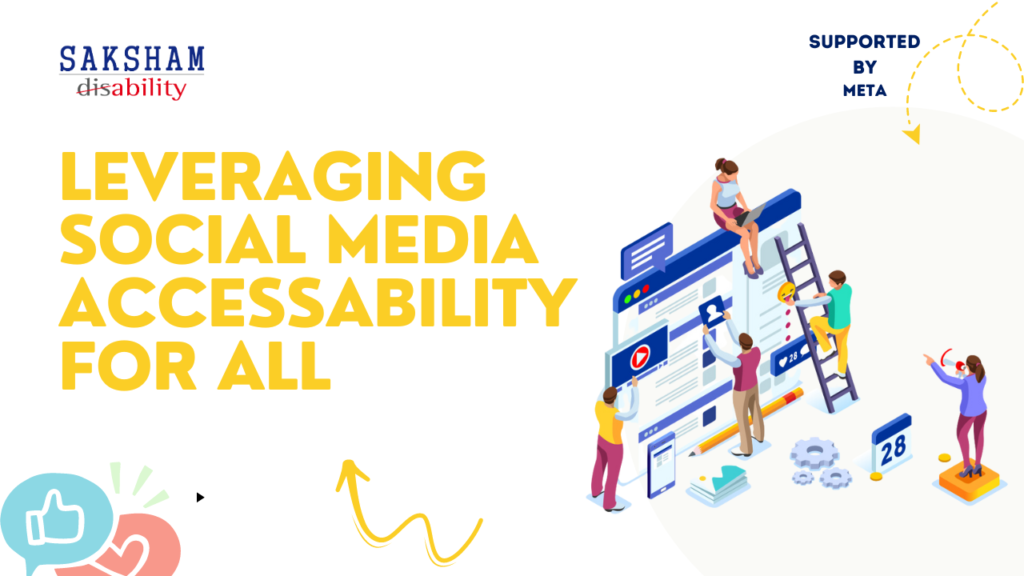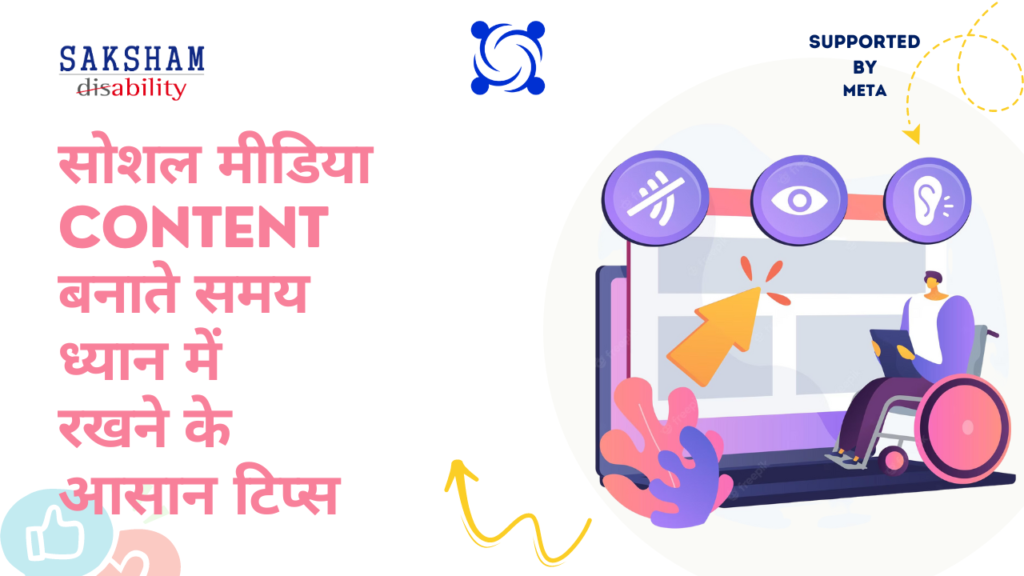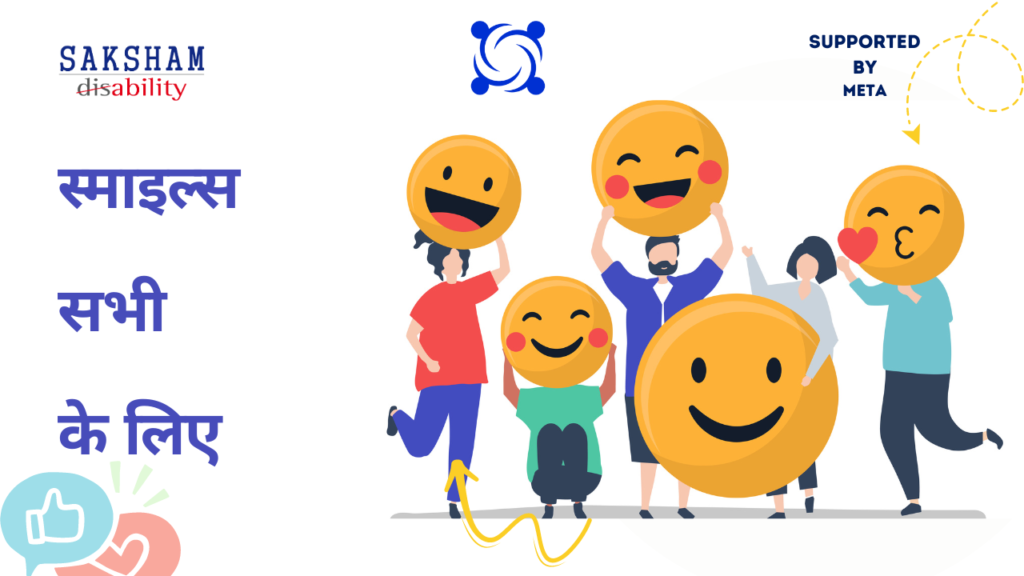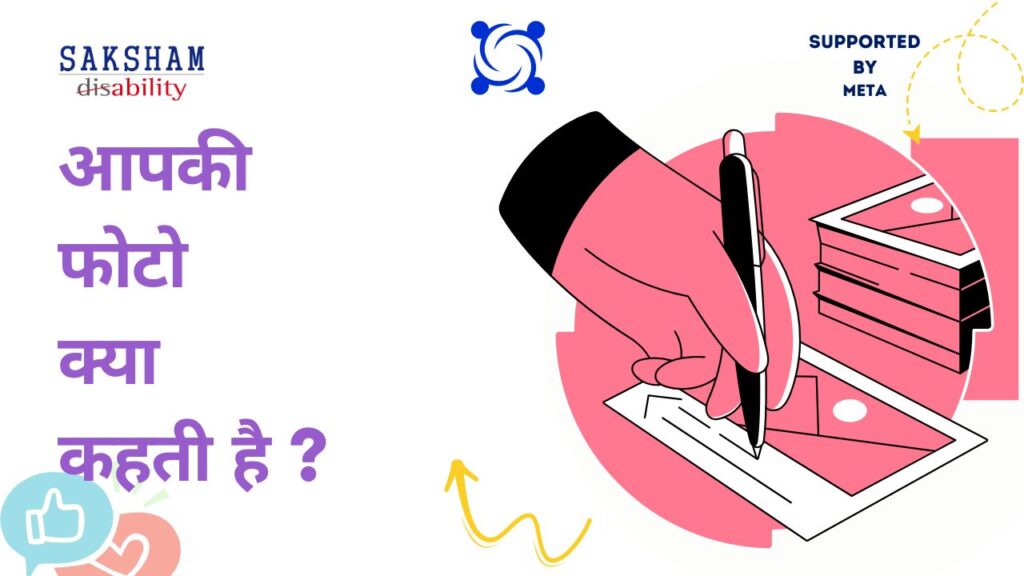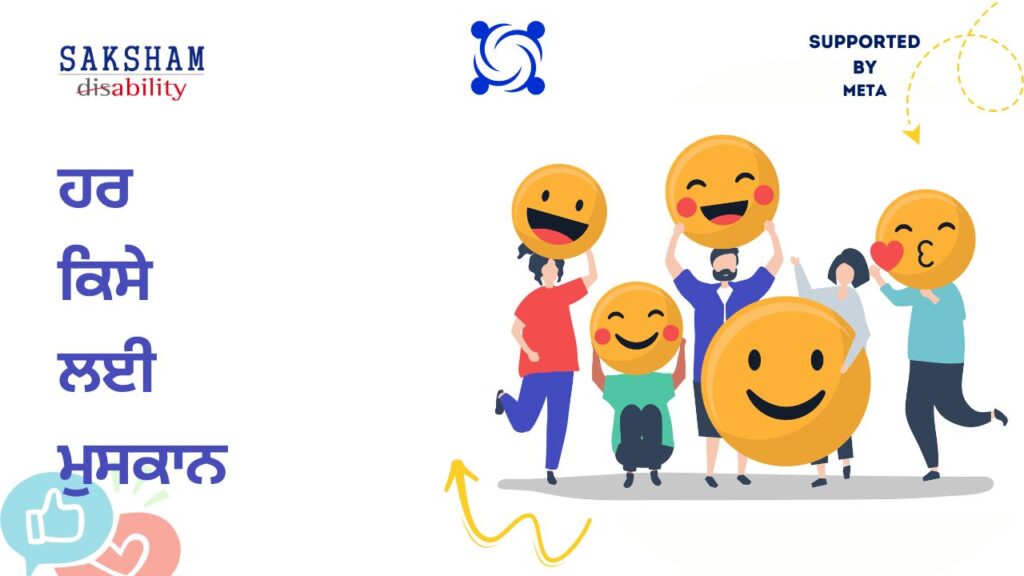Introducing "Leveraging Social Media AccessAbility For All"
Supported by Meta, Leveraging Social Media AccessAbility For All is Saksham’s biggest ever campaign to ensure inclusion of every individual’s content and accessibility needs across social media platforms. This includes the needs of India’s 26.8 million person with disabilities and 138 million older persons.
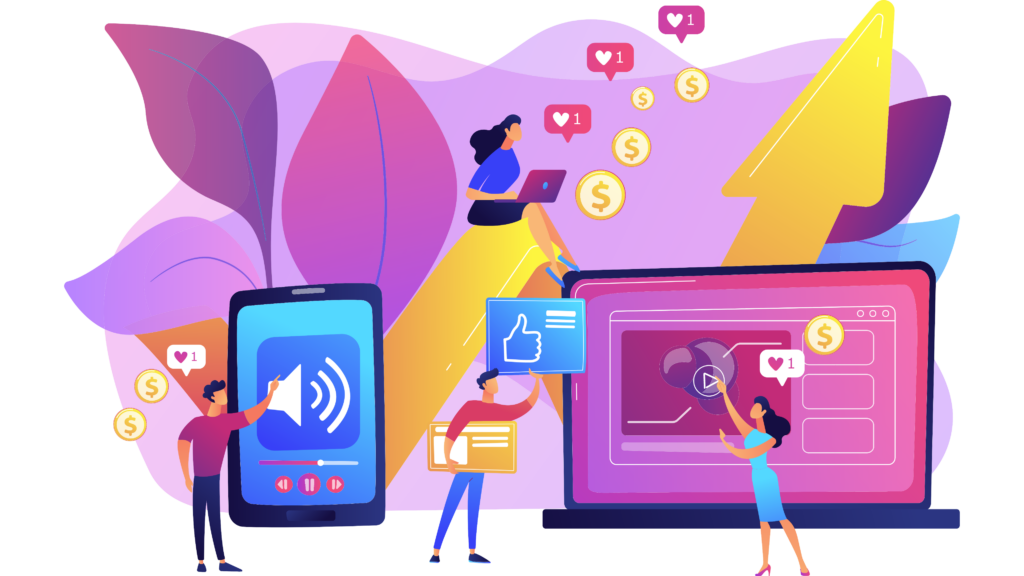
So What Is Accessibility?
Have you ever wondered if your friend with visual impairment is able to enjoy the photos you shared from your recent trip to Goa or laugh at that oh-so-funny meme that you found? Or how someone with a hearing impairment may enjoy the stand-up show that just got launched?
Well all this and more is possible and that’s where accessibility and accessible content comes in. Following some simple rules, one can create and receive content on social media platforms in their preferred format. The next time you put a photograph add an ‘alt-text’ describing the photo and a screen reader (an assistive technology) will read it out for your friend. The same way add captions in that stand-up clip and its enjoyable for all.
Let’s break this down further with a quick game.
if you were to put a smiley like :--) using text, the screen reader won’t read it. But simply inserting an emoji (the small picture for the emotion) will be read out loud by the screen reader for the visually impaired. This is because each emoji has a matching text description that is spoken out loud by the screen reader.
#GrowOurCommunity or #growourcommunity
If you capitalize the first letter of each word, it enables screen readers to pronounce hashtags properly.
Simple right? These steps may be small and easy but they can make a difference in someone getting information and not getting information. This is what Leveraging Social Media AccessAbility For All campaign is about. It aims to transform the way we create and share content to ensure social media is enjoyable and accessible to everyone.

Follow these 10 tips to make your social media a more inclusive and accessible place for everyone:
- Capitalize the first letter of each word when you use hashtags. For example, use #BestFriendForever instead of #bestfriendforever.
- Use simple language and shorter sentences to make it easier for people to follow and understand.
- Use sentence case instead of all caps to make it easier for people with cognitive and learning disabilities to read.
- Use emojis instead of creating emoticons with text: 😀 instead of : – )
- Avoid strong visual patterns, including strobing, flickering, blinking, and flashing, as they can make it difficult or impossible for people with cognitive or learning disabilities to focus and read your post. These visuals can even cause seizures for some people. make sure your GIFs flash no more than three times per second and run for less than 5 seconds.
- Use colours that provide a contrast ratio of at least 3:1 against the background, especially for text. If the text is smaller than 18pt, use a ratio of 4.5:1 or higher.
- Write alt-text for images you post on Facebook and Instagram.
- Include captions or a transcript with your videos to make them accessible to people who are deaf or hard of hearing.
- Turn on auto-generated captions for your Facebook Live and Instagram reels!
- Add audio descriptions to your video to make it accessible to visually impaired audiences.
Let’s work together to create a more inclusive online community!
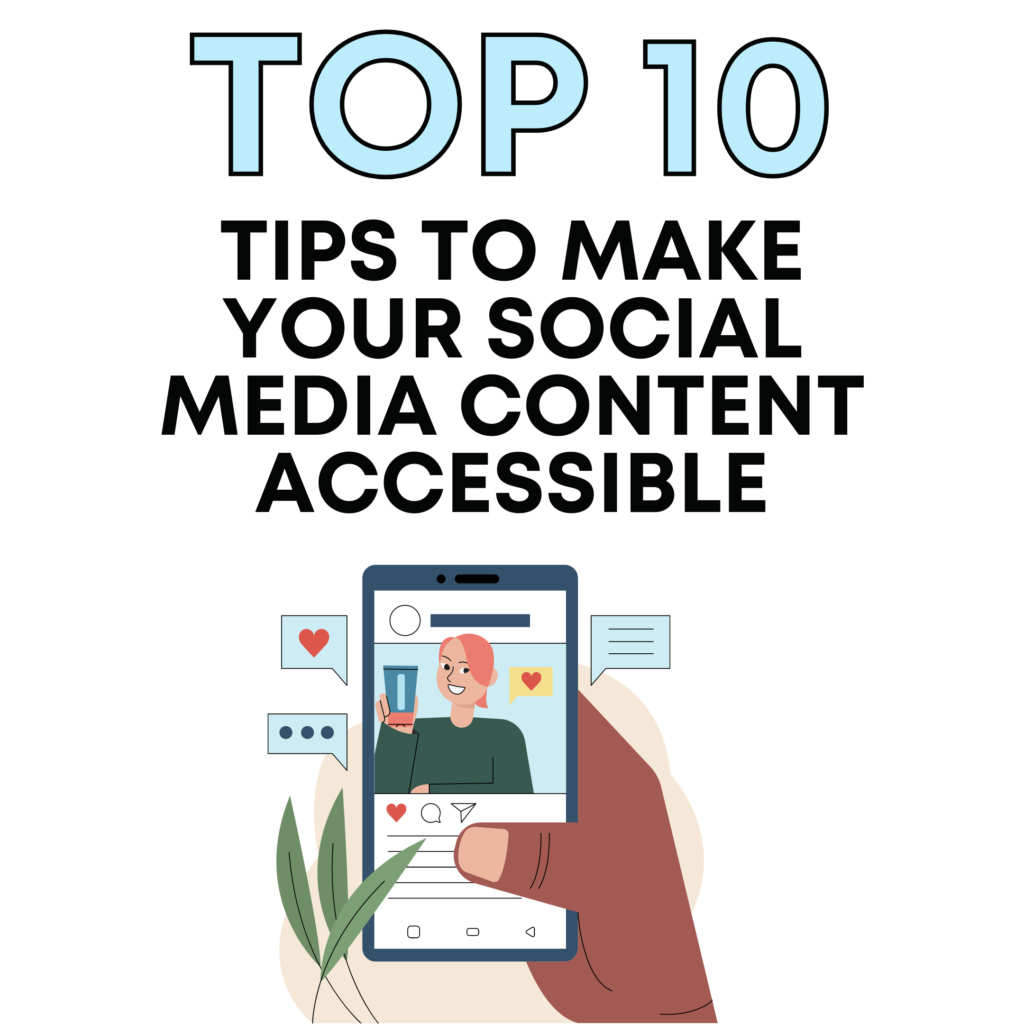
Why Is Social Media AccessAbility Important?
Most businesses, governments, news channels, and people now have Facebook, WhatsApp, and Instagram accounts where they share many of their products and news. We wouldn’t want anyone to miss out on these opportunities, news, and information.
Today, social media isn’t just a space where you talk to your friends. From getting to know about upcoming scholarships, to sharing e-books and chapters, to even learning about tough mathematics concepts through YouTube, its where learning happens. Did you know a study conducted last year with participants with disabilities found that 80% of participants used social media for their education and training? Social media as a learning tool opens tremendous opportunities for all, but it can do that if we make sure our content is accessible.
During the last few years we all saw how Covid disrupted our lives as we couldn’t step out or meet our friends. Social media continued to ensure that we all could talk to our loved ones and communicate. It allowed us all to remain connected. This connection is important but it must be open to all, won’t you agree?
The Government of India and International laws also protect every individual’s access to information and communication, including that of India’s 26 million+ persons with disabilities.
Social Media impacts everyone, including content access for millions and billons of people in India and across the world. No, we aren’t exaggerating. Facebook has 2.91 billion monthly active users; YouTube has 2.56 billion monthly active users; WhatsApp has 2 billion monthly active users; Instagram has 1.48 billion monthly active users! What’s more? India has 467 million active social media users and the world’s largest audiences on all these platforms - Facebook, YouTube, WhatsApp, and Instagram!

A Hub of Opportunities, News, Information, and Learning!
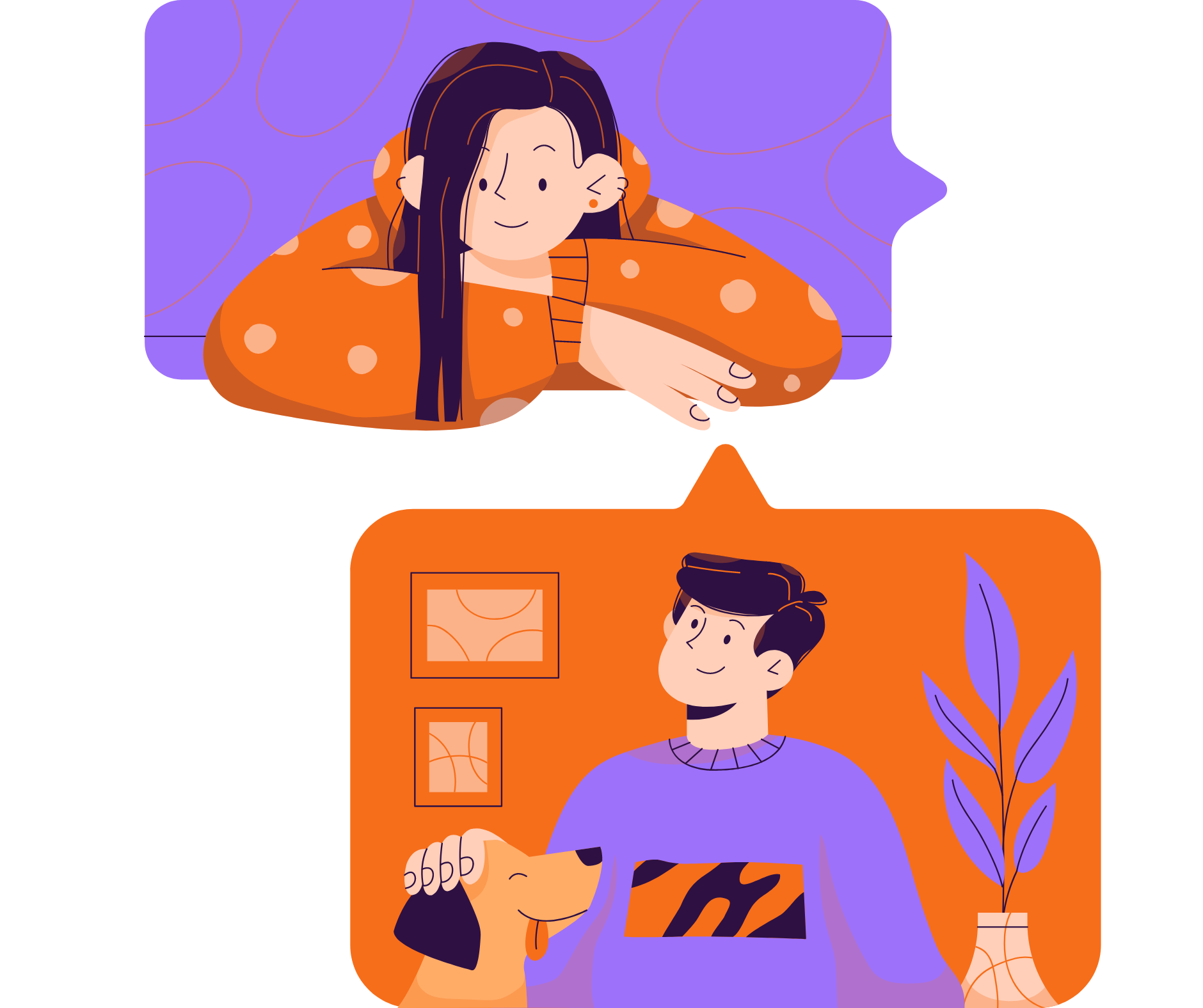
A Tool to Connect with our Loved Ones

It Impacts Everyone! Millions and Billions of Us
Newsroom - Check out the latest news from the Campaign!
On the occasion of the 12th Global Accessibility Awareness Day, Saksham has unveiled an engaging online initiative titled “Empowering Social Media Accessibility for All,” with the generous backing of Meta. In today’s interconnected global landscape, social media platforms such as Facebook, Instagram, and WhatsApp have seamlessly integrated into our social fabric.
When we share our thoughts and experiences, our desire is for our posts to resonate with the widest audience possible. Nevertheless, it’s imperative to recognize that numerous individuals grapple with visual impairments, hearing challenges, and other limitations that hinder their access to and comprehension of such content. To ensure the inclusivity and accessibility of our posts, it’s vital to contemplate certain adjustments in how we craft and present our material.
By doing so, we open the door for every individual to partake in reading and engaging with our posts, fostering a truly exceptional and enriching experience. Our objective is to propagate this message throughout society, with the overarching aim of democratizing social media accessibility for each and every person.
Should you come across any instances of accessibility barriers within your social circles or communities, we warmly encourage you to extend the reach of this campaign by informing your friends and acquaintances. In taking this step, you actively contribute to nurturing meaningful and impactful dialogues on social media that embrace the spirit of inclusiveness.
Furthermore, it’s worth noting that we have produced videos in Hindi, Punjabi, and Bangla to ensure that our message reaches a wider audience, reflecting our commitment to accessibility in diverse linguistic communities.
Leveraging Social Media AccessAbility for All - Video Series - English
लेवरेजिंग सोशल मीडिया एक्सेसिबिलिटी फॉर ऑल - Video Series in Hindi
ਸਾਰਿਆਂ ਲਈ ਸੋਸ਼ਲ ਮੀਡੀਆ ਪਹੁੰਚਯੋਗਤਾ ਦਾ ਲਾਭ ਉਠਾਉਣਾ - Video Series in Punjabi
Saksham at India Internet Governance Forum 2022
Saksham was selected to present at The India Internet Governance Forum (IIGF) 2022. The panel was held on 10 December “Wk 7: My Accessible Content: Skills for a Digital World”. The session explored how accessibility awareness and capacity building both, among persons with disabilities, and, the mainstream society is a need of the hour.
The panel included Mr George Abraham (disability activist and CEO of Score Foundation), Mr Dipendra Manocha (Saksham Founder and Managing Trustee), Ms Monica Desai (Global Head of the Connectivity and Access Policy for Meta), Ms Mandy Gupta Vasudev (Saksham Campaign Coordinator), and Ms Garima Avtar, Social Media Influencer and top women-rally driver. For full session visit: https://www.youtube.com/watch?v=X537ao8WQos
Susbcribe to Stay Informed
Sign up to our newsletter to get inspired and keep up to date with the latest campaign information!
©2022. Saksham All Rights Reserved.



